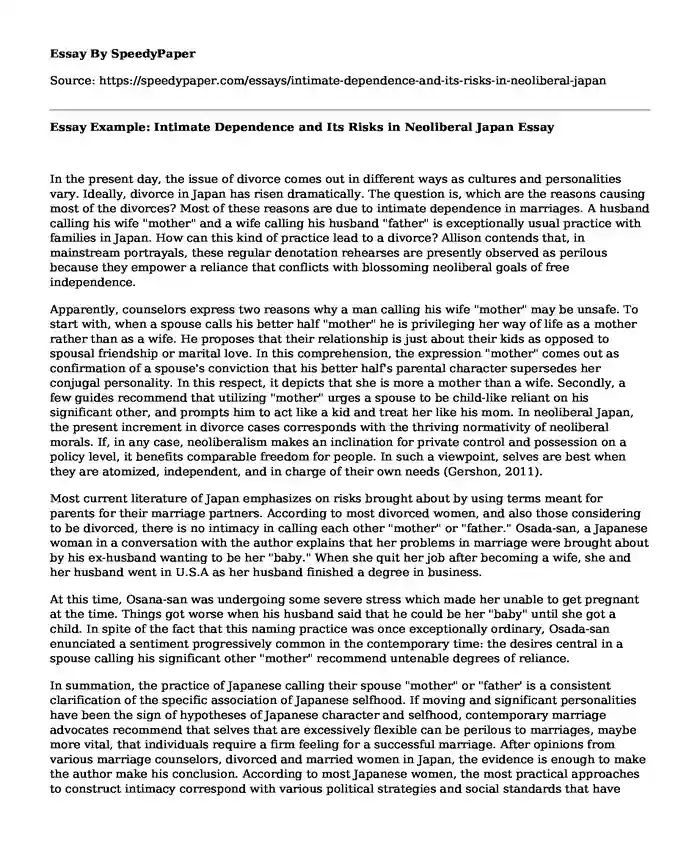
| Type of paper: | Literature review |
| Categories: | Family Relationship |
| Pages: | 3 |
| Wordcount: | 606 words |
In the present day, the issue of divorce comes out in different ways as cultures and personalities vary. Ideally, divorce in Japan has risen dramatically. The question is, which are the reasons causing most of the divorces? Most of these reasons are due to intimate dependence in marriages. A husband calling his wife "mother" and a wife calling his husband "father" is exceptionally usual practice with families in Japan. How can this kind of practice lead to a divorce? Allison contends that, in mainstream portrayals, these regular denotation rehearses are presently observed as perilous because they empower a reliance that conflicts with blossoming neoliberal goals of free independence.
Apparently, counselors express two reasons why a man calling his wife "mother" may be unsafe. To start with, when a spouse calls his better half "mother" he is privileging her way of life as a mother rather than as a wife. He proposes that their relationship is just about their kids as opposed to spousal friendship or marital love. In this comprehension, the expression "mother" comes out as confirmation of a spouse's conviction that his better half's parental character supersedes her conjugal personality. In this respect, it depicts that she is more a mother than a wife. Secondly, a few guides recommend that utilizing "mother" urges a spouse to be child-like reliant on his significant other, and prompts him to act like a kid and treat her like his mom. In neoliberal Japan, the present increment in divorce cases corresponds with the thriving normativity of neoliberal morals. If, in any case, neoliberalism makes an inclination for private control and possession on a policy level, it benefits comparable freedom for people. In such a viewpoint, selves are best when they are atomized, independent, and in charge of their own needs (Gershon, 2011).
Most current literature of Japan emphasizes on risks brought about by using terms meant for parents for their marriage partners. According to most divorced women, and also those considering to be divorced, there is no intimacy in calling each other "mother" or "father." Osada-san, a Japanese woman in a conversation with the author explains that her problems in marriage were brought about by his ex-husband wanting to be her "baby." When she quit her job after becoming a wife, she and her husband went in U.S.A as her husband finished a degree in business.
At this time, Osana-san was undergoing some severe stress which made her unable to get pregnant at the time. Things got worse when his husband said that he could be her "baby" until she got a child. In spite of the fact that this naming practice was once exceptionally ordinary, Osada-san enunciated a sentiment progressively common in the contemporary time: the desires central in a spouse calling his significant other "mother" recommend untenable degrees of reliance.
In summation, the practice of Japanese calling their spouse "mother" or "father' is a consistent clarification of the specific association of Japanese selfhood. If moving and significant personalities have been the sign of hypotheses of Japanese character and selfhood, contemporary marriage advocates recommend that selves that are excessively flexible can be perilous to marriages, maybe more vital, that individuals require a firm feeling for a successful marriage. After opinions from various marriage counselors, divorced and married women in Japan, the evidence is enough to make the author make his conclusion. According to most Japanese women, the most practical approaches to construct intimacy correspond with various political strategies and social standards that have reflected neoliberal morals of private control and individual obligation.
References
Alexy, A. (2011). Intimate dependence and its risks in neoliberal Japan. Anthropological Quarterly, 84(4), 895-917.
Cite this page
Essay Example: Intimate Dependence and Its Risks in Neoliberal Japan. (2022, Mar 15). Retrieved from https://speedypaper.com/essays/intimate-dependence-and-its-risks-in-neoliberal-japan
Request Removal
If you are the original author of this essay and no longer wish to have it published on the SpeedyPaper website, please click below to request its removal:
- Kant and Mill in the Free Philosophy Essay Sample
- Positive Impact of Rebellion, Free Essay in Political Science
- Essay Sample: Byzantine Ambassadors as Related by Ibn Al-Khatib
- Research Translation Assignment on Academic Literature, Free Paper
- Annotated Bibliography Paper Sample on Families with a Disabled Member
- Sources of Media Power, Essay Example for Everyone
- Literary Analysis Essay: My Country and My People by Lin Yutang
Popular categories




